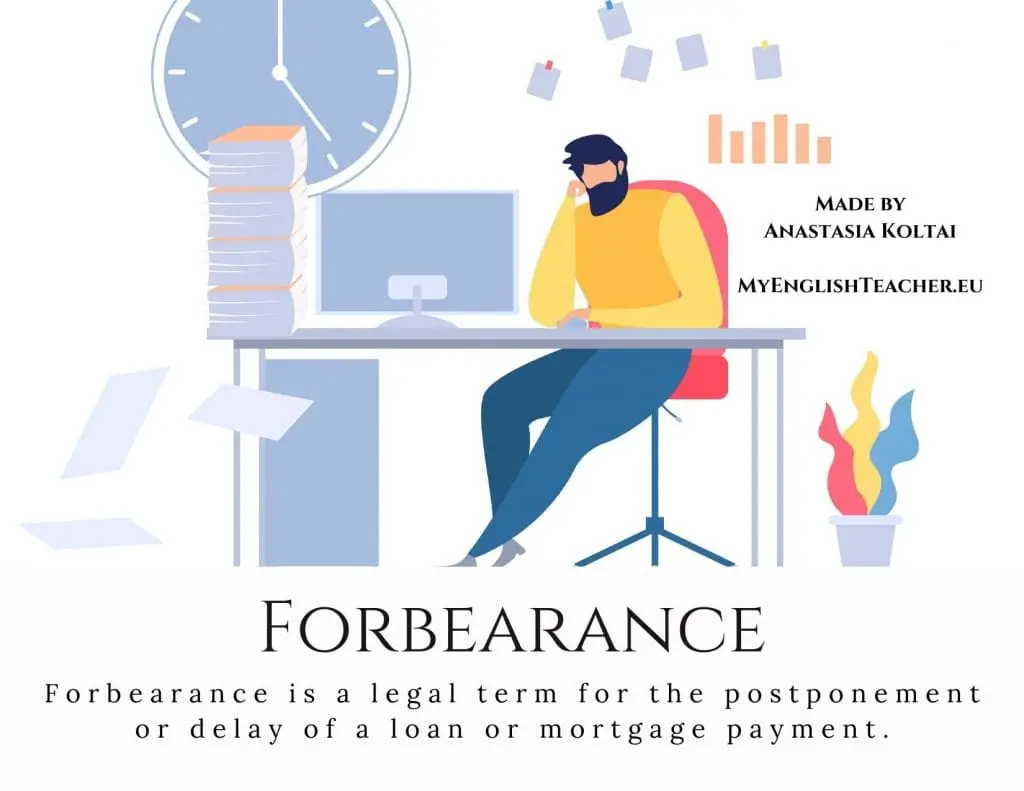
Forbear definition
Forbear is a verb and it means to abstain, refrain, withhold, or generally to not do something. Forbear is an old word, and stems from the Middle English. It is not so commonly used today, but in other forms such as nouns, or even adjectives, it has become more common.
In a sentence forbear is used like any other verb. The verb forms are: forbear / forbore / forborne / forbearing.
Forbear in a sentence
Examples
- Even thought I’m optimistic about the merger I forbear from making in certain predictions
- I have a sneaking suspicion that forbearing any surprises we will win the competition.
- How could you do that, couldn’t you forbore such an action?
- Had he not forborne with the marriage the land would have been ours.
Forbearing
Forbearing is the present continuous form of the verb forbear. It is used to describe an ongoing reluctance to do an action, or a feeling that the actions should be postponed.
Forbear synonyms
In general forbear pertains to any stopping action, or not doing something. There are multiple synonyms for the words, and since it’s a very old word these synonyms are more commonly used.
Examples
- abstain, refrain, desist, step back, give up, stop, swear off, cut off, decline, avoid, omit, restrain, pause, cease, forgo, etc.
Forbear antonyms
Words that have an opposite meaning from forbear are those that describe actually doing something. Since forbear is abstaining from something, describing the opposite is an antonym to that.
Examples
- persist, surrender, succumb, yield seek, indulge, give in, accept, continue, allow, aid, keep on, involve, meet, encourage, etc.
Forbearance definition
In a grammatical sense forbearance is the noun form of forbear, and its means to halt, stop, restrain, and generally not do something. However, forbearance is more commonly used in the world of banking. Even in banking it still means “holding back.”
Forbearance Agreement
Forbearance is tied to mortgages and property loans. It is an agreement between the lender and the borrower to delay a property going into foreclosure.
Forbearance in Real-estate
Foreclosure is when a property is being sold because the borrower can’t pay back the money. When forbearance is offered this payment is delayed so the property does not have to be sold if the borrower can pay the money on time.
In a sense forbearance is a grace period under which a person can manage to hopefully repay the money they owe. If they don’t manage that during the forbearance the property goes into foreclosure. The terms of the agreement are specified by the lender, which in most cases is a bank.
Forbearance on Mortgage
Forbearance is a legal term for the postponement of a loan or mortgage payment. It is the legal right of a bank to offer forbearance in designated cases. This has to be achieved through a complete agreement between the borrower (client) and the lender (bank).
Forbearance Legal and Plan
Once forbearance is agreed upon it can be done through various types of plans. That means that new deadlines and amounts can be established in order to help the borrower pay back the money without having to lose the property to foreclosure, or suspending the loan. Plans can be a one-time payment, installments, or just a monthly surcharge following a specific date. These plans and terms are dictated by the bank exclusively.
What’s Forbearance on a Student loan?
Receiving a forbearance on a student loans means that the borrower can pay at a postponed date, or according to a new plan. Since student loans are regular payments made until the debt is paid off, forbearance means that it will last longer considering the dates have been postponed. It is possible to get a forbearance on a student loan, but it is not common.
Forbearance vs deferment
Both forbearance and deferment can postpone the payment of a loan. Forbearance usually entails added fees and always adds more to what the borrower already owes. Deference, on the other hand, does not need to entail any added costs, and can simply be a postponement out of good will.
Forbearance Request
A forbearance request is a formal request issued by the borrower to the lender in order to ask for a postponement of upcoming payments. Requesting forbearance means asking for a new plan or method under which you can pay the loan, without having the property go into foreclosure. It is up to the lender to approve or decline the request, depending on the merits of the borrower.
Forbearance Biblical definition
Forbearance is mentioned in the Bible prominently in Romans 2:3-4. In the Bible it refers to the penance, patience, and will to suffer for our sins that was shown by Jesus Christ. Forbearance can also refer to the patience and penance that believers in God should show if they want to get closer to Jesus.
Forbearance synonyms
In general forbearance means refraining, or simply not doing something. It is a noun and has many synonyms.
Examples
- delay, postpone, tolerance, patience, restraint, stoicism, self-control, moderation, clemency, fortitude, etc.
Forbearance antonyms
Anything opposite from not doing something, delaying things, is an antonym to forbearance. Nouns that emphasize quick movements, and hasty measures.
Examples
- impatience, haste, defiance, disobedience, willfulness, reprisal, requital, wantonness, etc.
Forbearing one another in love
Forbearing one another in love means choosing to not pursue love because of personal reasons. Despite the fact that the lovers do have strong emotions for each other, because of reasons outside of this emotional bond they choose not to remains lovers. These circumstances can be familial, societal, religious, or others.
The post Forbear & Forbearance Definition appeared first on MyEnglishTeacher.eu Blog.
from MyEnglishTeacher.eu Blog https://ift.tt/2Pr8Qay
via Learn Online English Speaking
Comments
Post a Comment